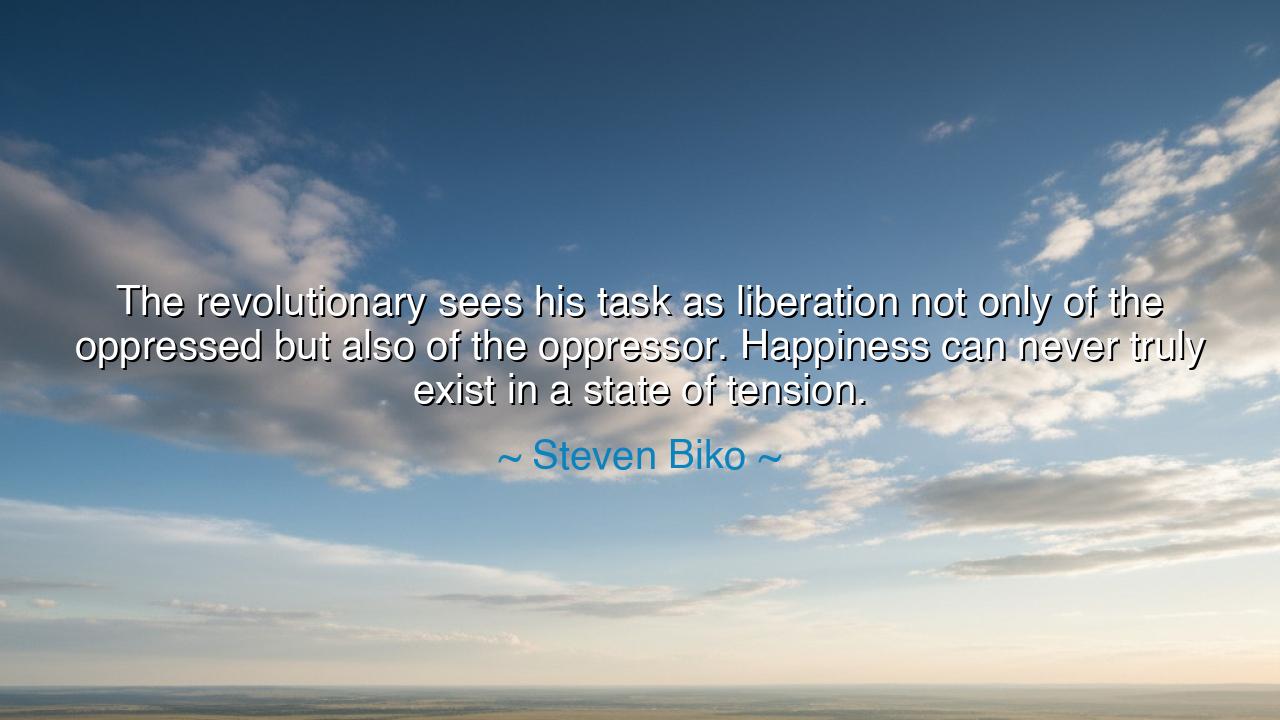
The revolutionary sees his task as liberation not only of the
The revolutionary sees his task as liberation not only of the oppressed but also of the oppressor. Happiness can never truly exist in a state of tension.






“The revolutionary sees his task as liberation not only of the oppressed but also of the oppressor. Happiness can never truly exist in a state of tension.” – Steven Biko
In these profound and timeless words, Steven Bantu Biko, the South African leader and martyr of the Black Consciousness Movement, speaks not only of political freedom, but of the spiritual liberation of humankind. His insight pierces beyond the walls of race and power, reaching into the very heart of the human condition. Biko reveals a truth known to prophets and sages alike: that the chains of injustice bind both the enslaved and the enslaver, and that true happiness can only be born from harmony, never from tension, domination, or fear. In his voice resounds the wisdom of one who understood that freedom is not vengeance, but healing; not separation, but the restoration of the soul’s dignity.
The origin of this quote lies in the fire of Biko’s struggle against apartheid — a system designed to divide, dehumanize, and crush the human spirit. Yet even within such cruelty, Biko’s vision remained pure and transcendent. He saw that the revolutionary’s task was not merely to overthrow tyranny, but to awaken the humanity that oppression destroys — in the oppressor as much as in the oppressed. For to dominate another is to poison one’s own soul; to live by injustice is to live in constant fear of retribution. Biko’s revolution, therefore, was one of consciousness — the awakening of dignity, identity, and empathy. It was not driven by hatred, but by the belief that only in restoring balance could both sides be made whole again.
“Happiness can never truly exist in a state of tension.” These words are a lament and a warning. They remind us that when one group lives at the expense of another, the resulting peace is but an illusion — a fragile calm beneath which resentment, guilt, and fear breed like shadows. A nation divided cannot know joy, just as a man at war with his conscience cannot know rest. Biko teaches that true happiness — whether for an individual or a people — is born not from dominance, but from justice, equality, and mutual respect. A world of masters and slaves, of winners and losers, may glitter for a while, but it will always tremble on the edge of collapse, for it defies the natural order of harmony that sustains life itself.
This truth is written in the history of humankind. Consider the life of Nelson Mandela, who, like Biko, endured the darkness of imprisonment for the sake of his people. When at last he was free, he could have sought revenge; the world would have understood. Yet he chose forgiveness, understanding that South Africa could not heal through hatred. He saw, as Biko had seen, that to build a just nation, both the oppressed and the oppressor must be liberated — one from the weight of suffering, the other from the burden of guilt. His choice was not weakness, but moral strength — the courage to see humanity in the enemy, and to free both sides from the endless cycle of fear and bitterness.
Biko’s teaching echoes the wisdom of the ancients. Lao Tzu taught that “he who conquers others is strong, but he who conquers himself is mighty.” Jesus of Nazareth said, “Love your enemies, for they know not what they do.” And Mahatma Gandhi declared that peace cannot be achieved through violence, for violence begets only more violence. In every age, the wise have known that liberation without compassion is incomplete — that victory without reconciliation is hollow. To end suffering, one must heal the heart, not merely change the throne. Thus, Biko’s revolution was not a cry of rage, but a call to human awakening.
Yet, to live this truth requires immense courage. For it is easier to hate than to heal, easier to destroy than to forgive. The revolutionary who seeks the freedom of both sides must walk the narrow path between justice and mercy. He must see his enemy not as a monster, but as a mirror — one who has lost his way, blinded by fear and pride. This kind of revolution cannot be fought only with weapons, but with understanding, discipline, and love. It is the revolution of the spirit — the battle to reclaim our shared humanity from the grasp of ignorance and greed.
So, my children, take this lesson into your hearts: seek liberation, but seek it for all. When you rise against injustice, do not let hatred guide your hand; let compassion temper your strength. When you speak truth to power, remember that your goal is not to destroy, but to transform. The world will tell you that happiness comes from victory — from conquering others, from claiming what is yours. But the wise know that happiness comes only from harmony, from the moment when tension gives way to peace, and the oppressor and oppressed can look upon one another as human once again.
For as Biko teaches, freedom that excludes is not freedom, and happiness built on suffering is not happiness at all. The true revolutionary is not a destroyer of worlds, but a builder of bridges. And until every heart learns this, mankind will remain divided against itself — restless, unfulfilled, and forever searching for the peace that only justice and understanding can bring.






AAdministratorAdministrator
Welcome, honored guests. Please leave a comment, we will respond soon